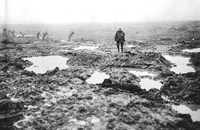Boreal
If Canada had come of age at Vimy,
there would have been no Passchendaele!
April 8, 2007 - On Monday, on a hill in northern France whose successful assault, as we judge these things, only cost 3,598 Canadian lives in four days of fighting in April 1917, a ceremony will take place, a ceremony to commemorate the 90th anniversary of the taking of Vimy Ridge by Canadian volunteers.
The taking of Vimy Ridge was a tactical success but like most pyrrhic victories in the great abattoir that were the muddy fields of Flanders, strategically irrelevant.
How do you justify so many young men and boys dying in a largely meaningless victory? You claim that those young men and boys who crossed an ocean because of sentimental attachment to an imperialistic power fighting an imperialist upstart, came of age: they became men, Canada had reached adulthood.
If that had been the case then there would have been no Passchendaele. Yes, at Vimy, the Canadians captured more ground, more prisoners and more guns than any previous British offensive in the two-and-a-half years of war leading up to the battle, but all that meant, was that the British commanders would even have less scruples in sending the colonials into more futile battles.
If Canada had come of age at Vimy then the
 greatest general Canada has ever produced, Arthur Currie of Victoria BC, could have stood up to the pathologically
incompetent commander of the British Expeditionary Forces, Sir Douglas Haig, who ordered the Canadians to join another
futile fight to capture another strategically insignificant ridge, the Passchendaele Ridge.
greatest general Canada has ever produced, Arthur Currie of Victoria BC, could have stood up to the pathologically
incompetent commander of the British Expeditionary Forces, Sir Douglas Haig, who ordered the Canadians to join another
futile fight to capture another strategically insignificant ridge, the Passchendaele Ridge.
At Vimy, Canada suffered 10,000 plus casualties. In the water and mud of Passchendaele they would suffer 15,654 with perhaps twice the lost of life as at Vimy.
If Canada came of age during the First World War, it was after Passchendaele. At a meeting of the Imperial War Cabinet in London, which he attended after the battle, Canadian Prime Minister Sir Robert Laird Borden seized the British Prime Minister Lloyd George by “the lapels of his frock coat and shook him” after warning him that if there was another Passchendaele “not a Canadian soldier will leave the shores of Canada.”
On Easter Sunday evening the CBC will air its long awaited docudrama The Great War. It is in this docudrama that Justin Trudeau, the son of Pierre, stars in the role of Talbot Papineau. Talbot Papineau is not only a French-Canadian First World War hero, and a hero to me, but he is also the ancestor of a brother-in-law.
Major Talbot Papineau’s name is on the Vimy monument. He died during the battle of Passchendaele. Like so many young men who fought in that pointless war, blown apart by an artillery shell as he went over the top.
The British would give the Butcher of Flanders, Sir Douglas Haig, £100,000, a few million dollars in today's currency, and a peerage for his services in The Great War. Canada would give the hero of Vimy nothing.
During the war, Curry had earned the enmity of the lunatic Minister of the Militia, Sam Hughes, for refusing the Minister's demand that he give his inexperience son, Garnet, a divisional command. The vindictive Hughes, and his sycophantic friends in Parliament and in Borden's cabinet, had not forgotten.
Not only would they oppose a small monetary payment (Curry, unlike Haig, was not a wealthy man) in recognition of his service to the nation but "the unspeakable Sam Hughes", in the words of Pierre Burton, seeking revenge for Curry's refusal to promote his son Garnet, accused Curry on the floor of the House of Commons of dereliction of duty.
The Honourable Sam Hughes' incompetent interference in military affairs and cronyism probably killed as many Canadian soldiers as Curry saved.
Hughes interfered with military decisions; he gave military contracts to friends which produced boots with cardboard soles that came apart in the muddy water-soaked trenches leading to trench foot, a condition similar to gangrene often requiring amputation to stop it from spreading; the Ross rifle which constantly jammed (when they had the chance, Canadian troops would toss the Ross and grab the trusty Lee-Enfield from British corpses); shovels with holes in the blade ostensibly to observe the enemy while being shot at
If you visit the first world war exhibit at the new, expansive and somewhat sterile Canadian War Museum in Ottawa don't be surprise if it's the meddling Sam Hughes that is front and center and not Canada's greatest military leader, Arthur Curry.
1. Quoted text is from Marching As To War. Canada’s Turbulent Years 1899-1953 by Pierre Berton, Doubleday Canada, 2001.
2. For the short, heroic, romantic, tragic life of Talbot Papineau, the grandson of the great Louis-Joseph Papineau, one of French Canada's most revered historical figure, read Sandra Gwyn's Tapestry of War, HarperCollins, 1992.
Bernard Payeur